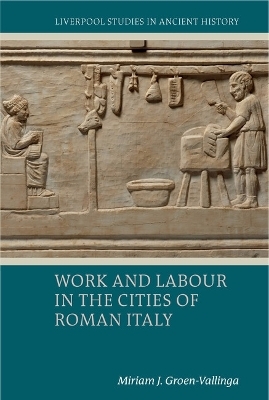
Work and Labour in the Cities of Roman Italy
Seiten
2024
Liverpool University Press (Verlag)
978-1-83553-848-7 (ISBN)
Liverpool University Press (Verlag)
978-1-83553-848-7 (ISBN)
- Lieferbar (Termin unbekannt)
- Versandkostenfrei
- Auch auf Rechnung
- Artikel merken
Work and labour are fundamental to an understanding of Roman society. In a world where reliable information was scarce and economic insecurity loomed large, social structures and networks of trust were of paramount importance to the way work was provided and filled in. Taking its cue from New Institutional Economics, this book deals with the wide range of factors shaping work and labour in the cities of Roman Italy under the early empire, from families and familial structures, to labour collectives, slavery, education and apprenticeship.
To illuminate the complexity of the market for labour, this monograph offers a new analysis of the occupational inscriptions and reliefs from Roman Italy, placing them in the wider context by means of documentary evidence like apprenticeship contracts, legal sources, and material remains. This synthesis therefore provides a comprehensive analysis of the ancient sources on work and labour in Roman urban society, leading to a novel interpretation of the market for work, and a fuller understanding of the daily lives of nonelite Romans. For some of them, work was indeed a source of pride, whereas for others it was merely a means to an end or a necessity of life.
To illuminate the complexity of the market for labour, this monograph offers a new analysis of the occupational inscriptions and reliefs from Roman Italy, placing them in the wider context by means of documentary evidence like apprenticeship contracts, legal sources, and material remains. This synthesis therefore provides a comprehensive analysis of the ancient sources on work and labour in Roman urban society, leading to a novel interpretation of the market for work, and a fuller understanding of the daily lives of nonelite Romans. For some of them, work was indeed a source of pride, whereas for others it was merely a means to an end or a necessity of life.
Miriam J. Groen-Vallinga is Associate Professor in Ancient History, Department of History, Art History and Classics, Radboud University Nijmegen.
Introduction: Aims, Methods and Sources
Labour and Labour Market Theories
Family Economics: Non-elite Households
Family Economics: The Elite Domus
Non-familial Labour Collectives: The Economics of Association
Conclusion: Social Structures and Urban Labour in Roman Italy
Appendices
Appendix 1: Catalogue of Job Titles
Appendix 2: Apprenticeship Contracts
Appendix 3: Taxonomy of Labour Relations
| Erscheinungsdatum | 27.09.2024 |
|---|---|
| Reihe/Serie | Liverpool Studies in Ancient History |
| Zusatzinfo | 1 Illustrations, black and white |
| Verlagsort | Liverpool |
| Sprache | englisch |
| Maße | 156 x 234 mm |
| Themenwelt | Geisteswissenschaften ► Archäologie |
| Geschichte ► Allgemeine Geschichte ► Vor- und Frühgeschichte | |
| Geschichte ► Allgemeine Geschichte ► Altertum / Antike | |
| Geschichte ► Teilgebiete der Geschichte ► Wirtschaftsgeschichte | |
| ISBN-10 | 1-83553-848-7 / 1835538487 |
| ISBN-13 | 978-1-83553-848-7 / 9781835538487 |
| Zustand | Neuware |
| Informationen gemäß Produktsicherheitsverordnung (GPSR) | |
| Haben Sie eine Frage zum Produkt? |
Mehr entdecken
aus dem Bereich
aus dem Bereich
Was Pompeji über uns erzählt
Buch | Hardcover (2023)
Propyläen (Verlag)
CHF 44,75
auf den Spuren der frühen Zivilisationen
Buch | Hardcover (2023)
C.H.Beck (Verlag)
CHF 27,95


